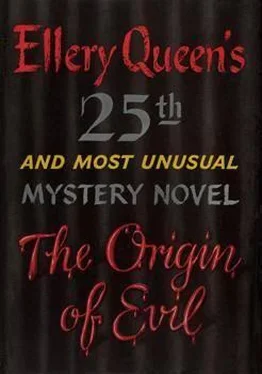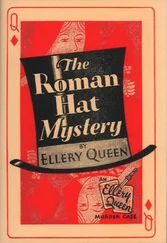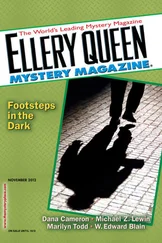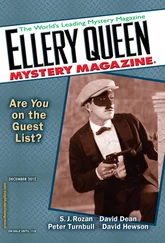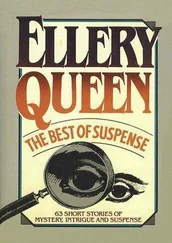They glanced at each other.
Keats tapped the T key with a fingernail. “Mr. Priam,” he said, “there’s only one key on this machine that’s new. It’s the T. The note to Hill was typed right here.” He spread his fingers over the carriage of Priam’s typewriter, almost with affection.
A sound, formless and a little beastly, came out of Priam’s throat. Keats stood by him, very close.
“And who could have typed a note on your machine, Mr. Priam?” asked Ellery in the friendliest of voices. “There’s no guesswork here. If I’d never seen this typewriter shelf I’d have known the machine is screwed on.
It would have to be, to keep it from falling off when the shelf is swung aside and dropped. Besides, Laurel Hill told me so.
“So, except for those times when the typewriter needs a major repair, it’s a permanent fixture of your wheelchair. Was the original of the note to Hill typed on your machine after it was removed for repair but before the broken T key was replaced? No, because the note was delivered to Hill two weeks before you sent the machine into Hollywood. Did someone type the note on your machine while you were out of your wheelchair? No, Mr. Priam, because you’re never out of your chair; you haven’t left it for fifteen years. Was the note typed on your machine while you were ― say ― asleep? Impossible; when the chair is a bed the shelf obviously can’t come up.
“So I’m very much afraid, Mr. Priam, there’s only one conclusion we can reach,” said Ellery. “ You typed that warning note yourself.
“It’s you who threatened your partner with death.
“The only active enemy out of your past and Hill’s, Mr. Priam, is Roger Priam.”
“Don’t misunderstand me,” said Ellery. “Charles Adam is not imaginary. He was an actual person, as our investigation uncovered. Adam disappeared in West Indian waters ‘over a score of years ago,’ as you wrote in the note, and he hasn’t been seen or heard of since. It was only the note that made us believe Adam was still alive. Knowing now that you wrote the note, we can only conclude that Adam didn’t survive the Beagle’s voyage twenty-five years ago after all, that you and Hill did succeed in killing him, and that his reappearance here in Southern California this summer was an illusion you deliberately engineered.
“Priam,” said Ellery, “you knew what a shock it would be to your partner Hill to learn that Adam was apparently alive after so many years of thinking he was dead. Not only alive but explicitly out for revenge. You knew that Hill would be particularly susceptible to such news. He had built a new life for himself. He was bound up emotionally with Laurel, his adopted daughter, who worshiped the man he seemed to be.
“So Adam’s ‘reappearance’ threatened not only Hill’s life but, what was possibly even more important to him, the whole structure of Laurel’s love for him. There was a good chance, you felt, that Hill’s bad heart ― he had had two attacks before ― could not survive such a shock. And you were right ― your note killed him.
“If Hill had any doubts about the authenticity of the note, you dispelled them the morning after the heart attack, when for the first time in fifteen years you took the trouble of having yourself carted over to Hill’s house. The cause could only have been a telephone agreement with Hill to have a confidential, urgent talk about the note. You had, I imagine, another and equally pressing reason for that unprecedented visit: You wanted to be sure the note was destroyed so that it couldn’t be traced back to your typewriter. Either Hill gave it to you and you destroyed it then or later, or he destroyed it before your eyes. What you didn’t know, Priam, and what he didn’t tell you, was that he had already made a copy of the note in his own handwriting and hidden it in his mattress. Why? Maybe after the first shock, when Hill thought it over, he hadn’t been quite convinced. Maybe a sixth sense told him before you got to him that something was wrong. Whether you convinced him during that visit or not, the note was probably already copied and in his mattress, and a native caution ― despite all your arguments ― made him leave it there and say nothing about it. We can’t know and won’t ever know just what went on in Hill’s mind.
“But the damage was done by the sheer impact of the shock, Priam.
Murder by fright,” said Ellery. “Far colder-blooded and more deliberate than killing by gun or knife, or even poison. A murder calling for great pains of premeditation. One wonders why. Not merely why you wanted to kill Hill, but why you splashed your crime so carefully with that elaborate camouflage of ‘the enemy out of the past.’
“Your motive must have been compelling. It couldn’t have been gain, because Hill’s death brought you no material benefits; his share of the business went to Laurel. It couldn’t have been to avoid exposure as the murderer of Adam twenty-five years ago, for Hill was neck-deep in that crime with you and had benefited from it equally ― he was hardly in a position to hold it over you. In fact, he was in a poorer position than you were to hold it over him, because Hill had the additional reason to want to keep it from Laurel. Nor is it likely that you killed him to avoid exposure for any other crime of which he might have gained knowledge, such as ― I take the obvious theory ― embezzlement of the firm’s funds. Because the truth is you have had very little to do with the running of Hill & Priam; it was Hill who ran it, while you merely put up a show of being an equal partner in work and responsibility. Never leaving your house, you could hardly have been so in control of daily events as to have been able to steal funds, or falsify accounts, or anything like that. Nor was it trouble over your wife. Hill’s relationship with Mrs. Priam was friendly and correct; besides,” said Ellery rather dryly, “he was getting past the age for that sort of thing.
“There’s only one thing you accomplished, Priam, by killing Leander Hill. So, in the absence of a positive indication in any other direction, I’m forced to conclude that that’s why you wanted Hill out of the way.
“And it’s confirmed by your character, Priam, the whole drive of your personality.
“By killing Hill you got rid of your business partner. That is one of the facts that emerge from his death. Is it the key fact? I think it is.
“Priam, you have an obsessive need to dominate, to dominate your immediate background and everyone in it. The one thing above all others that you can’t stand is dependence on others. With you the alternative is not so much independence of others as making others dependent on you. Because physically you’re helpless, you want power. You must be master ― even if, as in the case of your wife, you have to use another man to do it.
“You hated Hill because he, not you, was master of Hill & Priam. He ran it and he had run it for fifteen years with no more than token help from you. The firm’s employes looked up to him and loathed you. He made policy, purchases, sales; to accounts, big and small, Leander Hill was Hill & Priam and Roger Priam was a forgotten and useless invalid stuck away in a house somewhere. The fact that to Hill you owe your material security and the sound condition of Hill & Priam has festered inside of you for fifteen years. Even while you enjoyed the fruits of Hill’s efforts, they left a bitter taste in your mouth that eventually poisoned you.
“You planned his death.
“With Hill out of the way, you would be undisputed master of the business. That you might run it into the ground probably never occurred to you. But if it did, I’m sure the danger didn’t even make you hesitate. The big thing was to make everyone involved in or with Hill & Priam come crawling to you. The big thing was to be boss.”
Читать дальше
